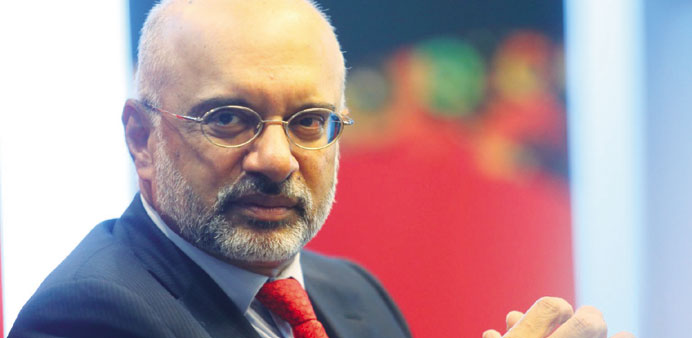Gupta: Chinese officials are steering the world’s 2nd-biggest economy to a ‘soft landing’ after years of rapid growth.
AFP/Beijing
China’s economy may be slowing but it is “not falling off a cliff”, the chief executive of Southeast Asia’s biggest bank said yesterday.
DBS Bank chief executive Piyush Gupta also said he does not see a repeat of the 1997-1998 Asian financial crisis arising from the turmoil in Chinese markets because the region is on a far stronger footing than it was 18 years ago.
A slowdown in the Chinese economy, a sharp fall in share prices and the devaluation of the yuan against the US dollar have hammered financial markets worldwide, underscoring China’s rising role as a global economic growth engine.
“We’re not seeing the country, the economy or demand falling off a cliff,” Gupta said during a luncheon with the Foreign Correspondents Association in Singapore, referring to China.
DBS is Singapore’s leading bank and the largest in Southeast Asia in terms of assets.
“There are sectoral issues, some sectors will suffer and the country is slowing but it is not falling off a cliff.”
Gupta said investors should take a broader look at China’s economy, noting that the drag came mainly from the industrial sector, in particular construction.
China’s services sector, which has taken on a bigger role in the economy, is expanding, resulting in buoyant retail sales, he said. “If you look at the headline retail sales numbers for China, it’s still tracking 10-12% (growth),” he said.
“It used to be 12-14, it’s come off a tad but 10-12% retail sales growth is not dramatically slow.”
Gupta also noted that while there has been a focus on the decline in the purchasing managers’ index (PMI) in the country’s manufacturing sector, less attention has been given to the PMI for services.
China’s manufacturing PMI slumped to a 77-month low to 47.1 in August, according an independent survey.
The figure, which dipped from July’s final reading of 47.8, was the worst since a reading of 44.8 in March 2009.
A figure above 50 signals growth, while anything below indicates contraction.
Gupta said manufacturing alone does not give a complete picture of the economy, which is shifting from a heavy reliance on exports to a greater role for domestic consumption.
The PMI for services rose to 53.9 in July which “explains why the retail sales numbers are relatively robust,” Gupta said.
“It’s not a smooth ride but they (Chinese authorities) haven’t lost the plot,” Gupta said. He said Chinese officials were steering the world’s second biggest economy to a “soft landing” after years of rapid growth.
The Asian Development Bank last month projected China’s economy to grow 7% this year and 6.8% next year, down from a March estimate of 7.2% in 2015 and 7% next year.

